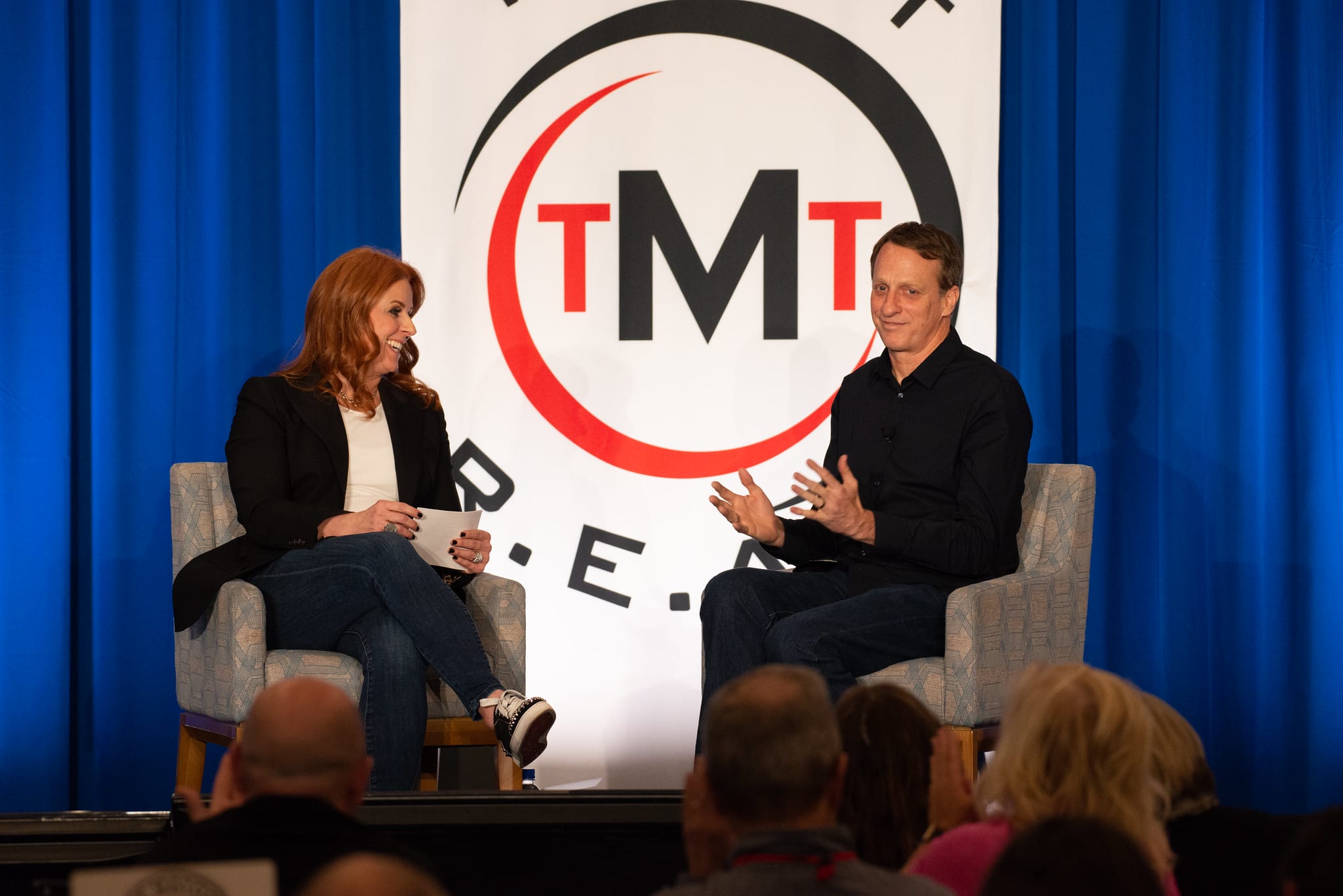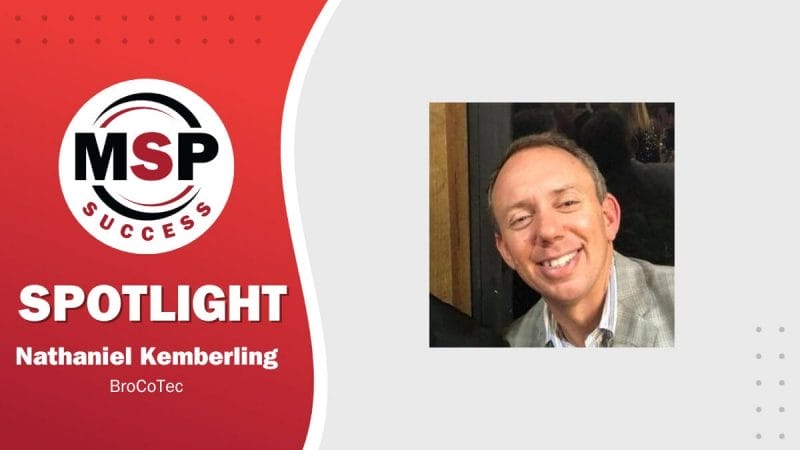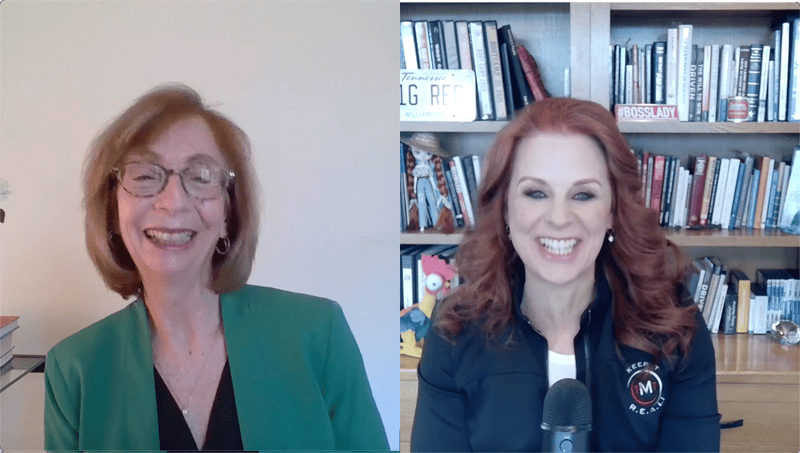From Legendary Pro Skateboarder And Entrepreneur Tony Hawk
It’s easy to look at successful people such as the legendary Tony Hawk and think it’s inevitable. But while it may seem like success came easy, it didn’t magically appear. Hawk, the pro skateboarder, entrepreneur, tech innovator, bestselling author, and founder of The Skatepark Project, was 9 years old when his brother gave him his first skateboard.
Hawk wasn’t a natural at skateboarding. He was small, describing himself as “the runt” for his age, and didn’t easily pick up the sport. The first time he got on a skateboard, he ran into a fence because he didn’t know how to turn. He was criticized by his elders and in magazines for his style. Because he was so small and couldn’t use his weight to get up in the air like the other skateboarders, he had to find a new way of doing tricks.
In 1982, at 14 years old, he turned pro. By 16, he was widely considered the best skateboarder in the world and was an athlete known by millions of people from all around the world. But that didn’t stop the haters or his struggles. Pros were quoted in magazines saying he didn’t deserve to be on top. In later years, when his dad got involved in the industry, Hawk was accused of being favored because of that relationship. When Hawk got a sponsorship with McDonald’s, he was criticized for being a sellout.
As skateboarding died out and went underground, the money stopped flowing, and Hawk had to figure out a way to stay in the industry he loved so much. In 1992, he started his own skate company, Birdhouse Projects (now Birdhouse Skateboards), but it was slow to get off the ground. After X Games brought new attention to skateboarding, Hawk made history landing a trick at the 1999 X Games no one had ever done.
Shortly thereafter, he launched Tony Hawk’s Pro Skater, which is now his billion-dollar video game franchise and one of the biggest franchises in history. The Hawk Empire includes Birdhouse Skateboards, Hawk Clothing, and the Tony Hawk Signature Series products as well as his production company, 900 Films. Recently, he was featured in an HBO documentary titled “Tony Hawk: Until the Wheels Fall Off” by the award-winning director Sam Jones.
Despite the criticism and the haters, not being a natural, and years of financial struggle while trying to build his business, he ended up on top, achieving incredible success.
In January 2023, during a private event, TMT founder Robin Robins sat down with Tony Hawk for a discussion in front of a live audience of TMT’s top tier clients. Here are takeaways from that discussion on how Hawk did it and what you can do to reach high levels of success in your business, too.
1. Set High Expectations For Yourself.
It didn’t matter what others thought; Hawk loved skateboarding so much that he truly believed he could be good at it. Once he was good, he didn’t stop there. He continued practicing so he could be great at it. “What got me to be good was the expectation that I had for myself,” Hawk said. “I thought, ‘I want to be able to do these things I see and I’m going to do that however I can.
I’m going to do whatever it takes to get there.’ Through injury and a lot of perseverance, I was able to do that. Once I got to be able to do those things, I didn’t stop. That was the key. I started to get good at it, and it wasn’t enough. I had to keep improving my skills. I had to see what was next and eventually started creating new techniques that hadn’t been done before. That’s when I started to cross over from, ‘Oh, he’s pretty good,’ to ‘Whoa, he’s creating something new here.’”
2. Surround Yourself With People Better Than You.
As Hawk got a lot better, he was invited to be a part of the Bones Brigade, a premier skateboarding team. Hawk credits this group for helping him not just improve but really elevate his skills. “I was lucky that Stacy Peralta, who was widely regarded as a legendary skater, but also the best curator of a skate team at the time, recognized me,” Hawk said. “His team was considered the best and the most diverse. When he recognized me, that gave me a boost of confidence I hadn’t had before because I was still struggling for acceptance. People called me a circus trick skater.
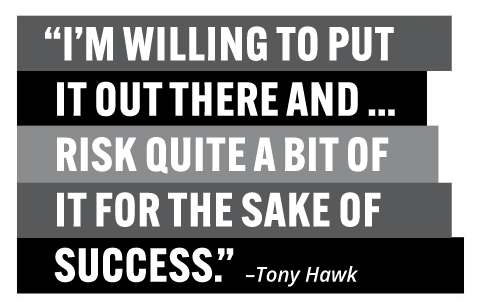
It was like, ‘Oh, he’s just a circus freak. He does these weird little board spins like he’s twirling a baton, and that’s not what skateboarding is about. Skateboarding is about power and style.’ He recognized something in me that gave me a boost of confidence. But being on that team definitely sent me to a new level of skating because of the expectation I put on myself.
‘Like, you’re a Bones Brigade member. You better step it up and do something really special.’ Suddenly, I’m hanging out with Steve Caballero, Mike McGill, and Rodney Mullen. They were only a couple of years older than me, but it felt like a lifetime older than me. Because they were in magazines and I was still struggling, it definitely was trial by fire. I just had to do it. I had to step it up.”
3. Understand That Failing Is An Important Part Of The Learning Process.
At the 1999 X Games, Hawk became the first skater to complete the 900, a 2 1/2-revolution (900 degrees) aerial spin performed on a skateboard ramp. It took him 10 years of failing at it over and over before he could complete it successfully.
“I embrace the failures because I feel like those are the learning process,” Hawk said. “Those are the lessons you need to learn to get to that next stage. The first time I ever tried the 900 was around 1987 when it was an idea. I kind of tested it, and it seemed impossible. I couldn’t get my body to spin that far. Years later, I finally figured out how to spin my body, but I didn’t know how to assess the landing.
A few years later, I got bold, and I tried to land and I broke my rib. Throughout that process, even though it was traumatic and discouraging, there was something to be learned from every stage. When I finally did it, there was an ‘aha’ moment. Like, ‘Oh, there was that one thing I was missing.’ But I needed to go through that process to figure it out. I embrace that timeline as opposed to letting it just be discouraging and give up.”
4. Commit To Success.
In learning difficult tricks, he only visualized successfully executing them. He NEVER doubted he could do it, even after failing repeatedly. “Everything in my head says, stay on, just hold onto it no matter what,” Hawk said. “Sometimes, I don’t even get ahold of it or I’m holding on, I’m doing everything that I think I should, and it just doesn’t happen. What I’m telling myself is to commit. That’s pretty much it. In various ways, I’m just saying commit to it. As soon as you doubt it, it doesn’t happen. Or if you picture yourself in the worst-case scenario, that’s what’s going to happen.”
5. Embrace Learning And Be Willing To Take Risks.
As a top athlete and top business pro, the psychological aspects of being willing to overcome hard things contributed greatly to his success.
“There’s a lot to be said for having confidence, and the confidence that I’ve gained and built through my skating career lent itself to business quite a bit,” Hawk said. “Not being afraid to take risks is paramount to any success. I’m willing to put it out there and … risk quite a bit of it for the sake of success. I learned a lot along the way, and I was also very eager to learn about the business. It would’ve been simple for me to say, ‘Yeah, I’ll put my name on that, and I hope it works.’ But I was definitely right there in every part of the process. I’ve held that very dearly because I wanted to represent skateboarding well, not just my own name.”
6. Don’t Give Up.
Before connecting with Activision, Hawk was approached by a PC developer who’d created an engine for skateboarding. He teamed up with the developer, and they went around pitching the idea of creating a new skateboarding video game to a lot of console manufacturers and software developers, but no one bit. “It was very discouraging,” Hawk said. “In fact, some were outright insulting.” After a year of hearing “no,” the developer got frustrated and gave up.
“I remember this distinctly. He told me, ‘Look, I’ve got to go make a living. But I sense that because we were taking these meetings, your name is out there in the ether of video games, and so if someone were to do a game, they probably want to call you.’” Hawk was doubtful, but less than a year later, Activision called and said, “We heard you want to do a game.” Hawk took a meeting with Activision, and after trying a game they were working on, he signed a deal on the spot. One year later, the Tony Hawk’s Pro Skater video game was released.
7. When Things Are Hard, Dig Deep.
His passion has always been his primary driver. When he started, skating was beginning to die. There was no money to be made in the industry, so he was in it for the love of it. However, as success came, he made a lot of money fast and furiously, earning enough to buy a house when he was only 17 years old and a senior in high school. But when the industry crashed when he was only 24 years old, he thought his career was over. Not only was he considered old for a skater, but the industry also completely fell away. Because he loved it so much, he dug deep and figured out how to keep his dream alive.
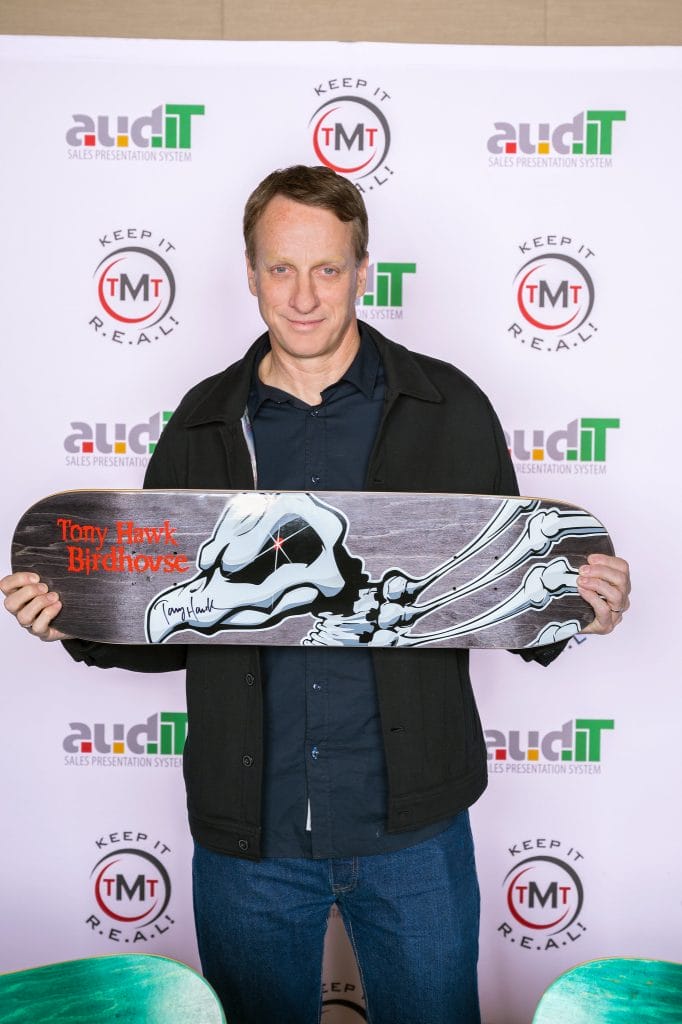
“I thought my career as an actual skateboarder was starting to fade, and I wanted to stay in the industry because I just loved it,” Hawk said. “I loved the culture; I loved the business of it. I loved what it brought to me through my formative years. So, I wanted to stay in it. I also wanted to create a team much in the way that Peralta created the Bones Brigade. So, I chose to start a company and took out the equity from my second home to start the business.
This seems crazy because, at the time, skating was in such a lull. But I also felt like I had already seen skateboarding come and go twice in my lifetime. It’s bound to come again. I hope it’s bound to come back around again. And when it does, we will have established ourselves as one of the best brands because we have one of the best teams. We have a unique direction. We have good aesthetics, and we have set ourselves apart from the rest of the industry.
I felt pretty good about that. It took a lot longer than I thought. Through those years, I ended up selling that house for what I owed on it, moving back into the other smaller place I lived in during high school, and living off peanut butter and jelly, Top Ramen, and Taco Bell for probably three years, all while trying to keep the business afloat and keep the team happy. We would drive across the country to skate shops, skate in their parking lots, beg them for money for gas and food, and maybe a hotel that we’re all going to share in one room, then go on to the next one.
But in those days, it was a struggle financially, but also, we still got to skate, so we were kind of still living the dream. It was on a much smaller scale; it was much rawer. There were no trainers or anything. I remember distinctly one of our skaters fractured his wrist. We went to the hospital, and it was going to take hours for him to be seen, so we just drove on to the next city, and he figured it out and wore a wrist brace the whole time. It was just stuff like that.”
8. Practice Gratitude.
Originally, Hawk had a partner at Birdhouse Skateboards. The two of them kept taking pay cuts and cutting costs to make the business work at a time when skateboarding wasn’t popular. Gratitude for being able to remain in an industry he loved was what kept him going. “We both believed in it so much, and there were a couple of times where we had heavy conversations like, ‘Are we going to have to give this up?’ and then we would make another cut and we would stay afloat. Eventually, it came back around. It took a lot longer, and it was tricky, but all the while, I was just thankful we were still doing it. We were still in the business. When it did come back around, it came back around in a way we never imagined in terms of how big it got.”
9. Believe In Your Dream.
There will be pressure to give up. There may be family members who look at you like you’re a failure. Even when others don’t, you must believe in your dream until you make it a reality. Nobody paid attention to skateboarding for years, so it had undergone a revolution as it moved underground. It turned into a street activity with new moves and styles, so when the inaugural X Games was held during the summer of 1995, it became a catalyst for people to start paying attention to skateboarding again. “It took a lot longer for my business to succeed, but I believed in it so much,” Hawk said.
10. Find Your Tribe.
Hawk has dealt with a lot of bullies throughout his entire life, including his elders within the skate community. Growing up with bullies, criticism, and hate taught him how to ignore criticism. “It was weird because skateboarding was such a small community at the time, so we’re already outcasts from mainstream sports,” he said. “And now I’m an outcast within this little outcast community. It was very isolating.
But at the same time, it taught me resilience and to just believe in what I was doing. Because it gave me so much for my sense of confidence and mental health, I just ignored all that noise. I found salvation in my peers because I did have friends who were of the same mindset. We had the same type of approach to skating. We would bounce ideas off each other, and I always felt validated by them. That was my big help. Having the skate park was where I found my crew, my tribe, and my direction. It’s where I developed my own style. That’s very much why I started a foundation for public skate parks because of what it brought to me as a kid.”
11. Don’t Do It Alone.
To scale, Hawk built a team around him that he trusts. “I have an awesome team behind me that will filter and vet things before they even get to me,” Hawk said. “They have the same sort of sense of values and aesthetics that they know what’s authentic to skateboarding or what’s authentic to what I do or my brand or video games. It’s more about surrounding yourself with those people you trust.”
12. Know Your Customer At A Deep Level.
Through experiencing both success and failures in the skateboarding industry and being face-to-face with his customers, Hawk has developed a tremendous understanding of his ideal audience. “I have a radar for authenticity and know what will resonate with our customers,” he said. “That just comes from walking the walk and skating. You can’t fake skating, and you can’t cheat at skating. It takes so much perseverance and so much effort. You’re literally in the streets, so I have that to my advantage where I can tell if something looks authentic or if something is going to resonate with the skate community or with the action sports or street culture community.”
13. Celebrate How Far You’ve Come.
What gets Hawk charged up and keeps him excited is to see how far he’s come and how far the sport has come. By staying the course and remaining involved in the industry, he has been able to enjoy experiences he never would have thought possible, such as being invited to the Olympic games and being the first skater to ride the Olympic course. “It’s so exciting to be alive and to be part of the skate scene, to see it thriving so much and to see it become this international interest and phenomenon and so inclusive,” Hawk said. “For me, that’s what fires me up, to see how far skateboarding has come and that it’s for everyone. That it is truly international.”
As you strive to grow your IT business, take risks and stay committed to the process. Believe in yourself and figure out how to push through the tough times. As you reach new levels of success and achieve the top of your profession, Hawk advises you to release yourself from the pressure by giving yourself permission to fail. Continue to push yourself but focus on your strengths rather than doing something completely outside your wheelhouse. “Embrace your failures. Don’t rest on your accolades.” Most of all, he says to figure out and know what your priorities are. When you do that, you’ll always be a success in the things that matter most.
Get more details about Robin’s interview with Tony Hawk here: https://mspsuccess.com/2023/04/how-to-manage-critics


